Maintaining your dog’s joint health is essential for their long-term comfort and mobility. Dogs rely on healthy joints to play, walk, and explore, so preventing and treating joint issues is crucial. According to veterinary research and experts, one in four dogs suffers from arthritis. In fact, about 20% of dogs over age one have osteoarthritis, with the incidence rising sharply in senior pets. Large and giant breeds, obese dogs, and seniors are especially at risk. Proper care – including weight management, exercise, and diet – is vital, and many owners turn to supplements to protect their dog’s joints. In this guide, we explore the best joint health supplements for dogs, from top ingredients to user-friendly forms (powders, liquids, chews), and answer common questions. We use the main keyword joint health supplement for dogs and related terms naturally, aiming to help you choose safe, effective products of joint health supplement for dogs.
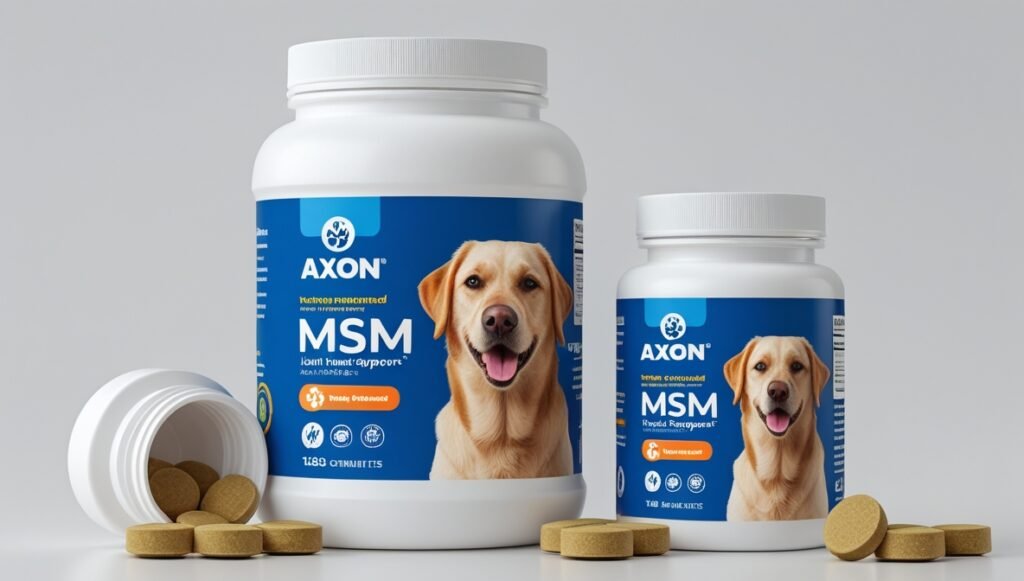
Table of Contents
Why Joint Health Is Crucial for Dogs
Dogs of all ages can suffer joint wear and tear, but the problem increases with age. As Shadow Creek Veterinary Clinic notes, about 20% of dogs over one year old have osteoarthritis, and in dogs over seven years, up to 80% show symptoms. This high prevalence means many pet owners will confront joint issues. Joint problems can stem from genetics (hip or elbow dysplasia), injuries (cruciate tears), obesity (extra weight on joints), or simply aging (natural cartilage breakdown). Common symptoms include stiffness after rest, limping, reluctance to climb stairs or jump, and behavioral changes like irritability.
Fortunately, there are proven ways to support joint health. In addition to exercise and weight control, joint health supplements have become a cornerstone of managing and preventing joint pain. These supplements often contain substances like glucosamine, chondroitin, and Omega-3 fatty acids, which help maintain cartilage and reduce inflammation. The American Kennel Club notes that joint supplements are one of the most common long-term treatments for arthritis in dogs. By adding the right supplement, you can help reduce inflammation, protect cartilage, and improve your dog’s mobility and quality of life.
Dogs Most at Risk for Joint Issues
While all dogs can potentially develop joint issues, certain factors increase the risk:
- Breed and Size: Large and giant breeds (e.g. Labradors, German Shepherds, Retrievers) have more weight stressing their joints, and many are genetically predisposed to hip/elbow dysplasia. Even mixed breeds with large ancestry can be affected.
- Age: Senior dogs (7+ years) are much more likely to show arthritis symptoms. Aging reduces the body’s ability to repair cartilage, making elderly dogs common candidates for joint pain.
- Weight: Overweight or obese dogs have extra pressure on joints, accelerating wear and tear. Slim dogs put far less stress on their hips, knees, and spine.
- Injuries: Dogs with past joint injuries (like fractures or ligament tears) or congenital issues (like luxating patella) often develop arthritis earlier.
- Lifestyle: Dogs with very high activity (working dogs, agility competitors) may strain joints, while sedentary dogs may have weaker muscles supporting joints.
Recognizing these risk factors helps pet owners decide when to start preventative care. For example, large-breed puppies might begin joint supplements early to support growing joints, while senior dogs often need more intensive support to maintain comfort.
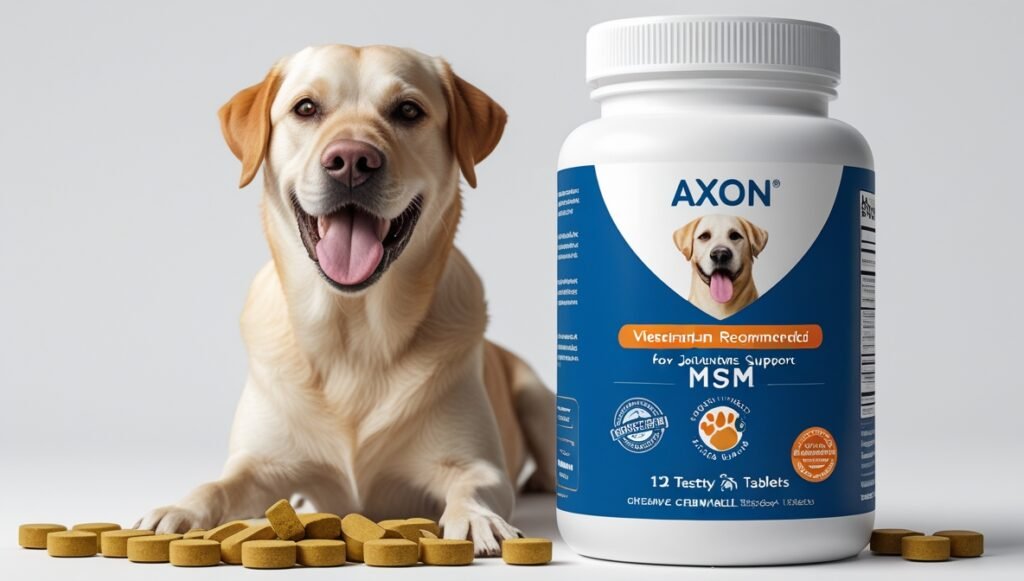
How joint health supplement for dogs is helpfull:
Joint supplements work by providing nutrients and compounds that support cartilage, synovial fluid, and overall joint integrity. Unlike painkillers (NSAIDs like carprofen or meloxicam, which can have side effects if overused), supplements generally have a lower risk of adverse effects and can be used long-term.
Clinical research supports the use of certain ingredients. For instance, one well-designed trial found that dogs receiving a glucosamine + chondroitin supplement experienced a significant reduction in pain over time. By 150 days of supplementation, overall pain scores had decreased by about 51%. Notably, these dogs showed no side effects, highlighting the safety of such supplements when used properly.
Many veterinarians and organizations agree that glucosamine and chondroitin are key components of joint therapy. According to the AKC, “Joint supplements commonly include glucosamine and chondroitin, as well as green-lipped mussel”. These ingredients help by:
- Reducing Inflammation: Supplements help tamp down chronic inflammation in the joint capsule. Chronic inflammation drives pain and cartilage breakdown in arthritis joint health supplement for dogs.
- Repairing Cartilage: Glucosamine and chondroitin are natural building blocks of cartilage. By providing them in higher amounts, supplements may boost the body’s repair of joint cartilage and slow degradation.
- Lubricating Joints: Compounds like hyaluronic acid improve joint lubrication (synovial fluid viscosity), making movement smoother for dogs with stiff joints joint health supplement for dogs.
- Supporting Overall Health: Ingredients like Omega-3 fatty acids (from fish oil or green-lipped mussel) provide additional anti-inflammatory benefits and general health support joint health supplement for dogs.
Overall, supplements won’t cure arthritis, but they can improve comfort and mobility. Combined with weight control and exercise, they form a multi-faceted approach to joint health. Many owners find that daily supplementation lets their dogs move more freely without as much reliance on medications joint health supplement for dogs.
Key Ingredients in Canine Joint Supplements
When evaluating any dog joint supplement, inspect the active ingredients closely. The most evidence-backed ingredients include:
- Glucosamine: A building block of cartilage, glucosamine aids cartilage repair and reduces joint pain. It “alleviates pain and stiffness by suppressing inflammation in the arthritic joint, inhibiting cartilage degradation, and boosting repair of damaged cartilage,” notes the AKC. Unlike many human pain relievers, glucosamine is safe for long-term use in dogs, making it ideal for ongoing joint support joint health supplement for dogs.
- Chondroitin Sulfate: Often paired with glucosamine, chondroitin also contributes to cartilage health. It “reduces pain, improves joint function and mobility, and reduces arthritis progression”. Chondroitin helps retain water in the cartilage, keeping it spongy. For best effect, use supplements with a scientifically effective dose of chondroitin, as levels can vary by product.
- Methylsulfonylmethane (MSM): A natural sulfur compound, MSM has anti-inflammatory properties. It can help reduce joint swelling and pain when combined with glucosamine/chondroitin. MSM is also thought to support connective tissue health. Many high-quality supplements include MSM for its synergistic effect joint health supplement for dogs.
- Omega-3 Fatty Acids: Found in fish oil and flaxseed, Omega-3s have strong anti-inflammatory action. They can help reduce joint swelling and pain, especially in arthritic or overweight dogs. Including Omega-3s (EPA and DHA) can also benefit skin, coat, and heart health.
- Green-Lipped Mussel (GLM): Native to New Zealand, GLM is a shellfish rich in Omega-3s and other nutrients. The AKC notes that GLM contains “anti-inflammatory and joint-protecting properties,” and when combined with glucosamine and chondroitin it can help decrease pain and preserve joint function. GLM adds natural nutrients that some dogs tolerate well, though shellfish can be an allergen for a few.
- Hyaluronic Acid (HA): A component of synovial fluid, HA helps lubricate joints. Oral HA supplements aim to improve joint fluid viscosity and cushioning. Studies in dogs suggest oral HA can ease arthritis pain. Senior dogs often benefit from HA supplementation to support aging joints.
- Type II Collagen (UC-II): Undenatured type II collagen is claimed to help the immune system calm inflammation in the joints. Some products add UC-II, but evidence is more limited than for glucosamine/chondroitin. It’s sometimes marketed as aiding dogs with autoimmune joint inflammation joint health supplement for dogs.
- Turmeric/Curcumin and Boswellia: These herbal supplements have antioxidant and anti-inflammatory effects. They may support joint health, but absorption and dosing are concerns. High-quality formulas use bioavailable forms. (Be cautious: human anti-inflammatory drugs like ibuprofen or acetaminophen are toxic to dogs; do NOT give these. Stick to dog-formulated supplements joint health supplement for dogs.
When reading labels, make sure the dosage of active ingredients is adequate. For example, a typical daily dose for a 25 lb dog might be around 2500 mg glucosamine HCl and 2000 mg chondroitin (split into 2 doses). Check whether the supplement provides enough grams of each component per daily serving, not just percentages. Also ensure minimal fillers and additives – the best joint supplements are as pure as possible, giving your dog more active nutrients per dose joint health supplement for dogs.
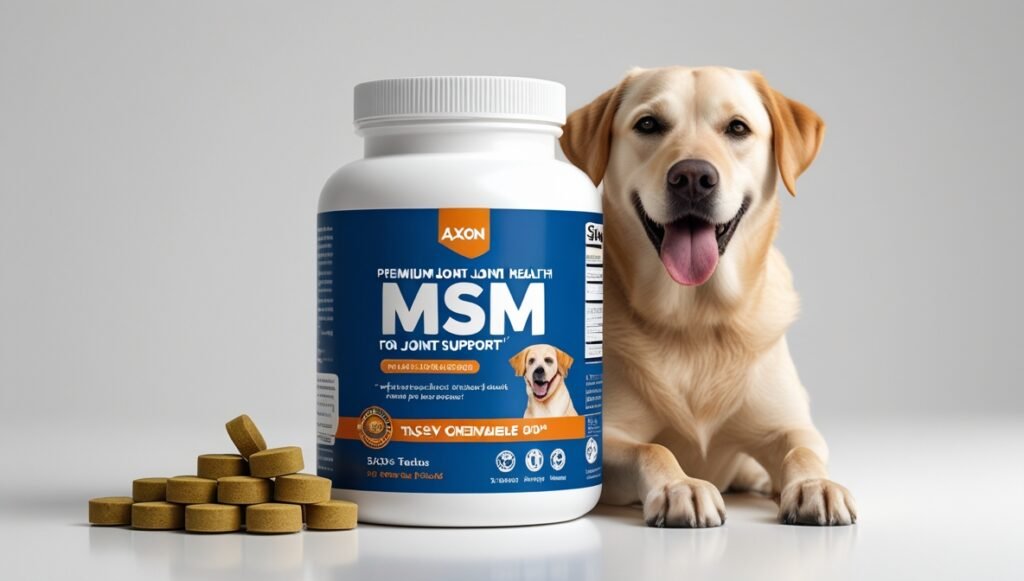
Forms of Joint Supplements: Powder, Liquid, Chews, Capsules
Joint supplements for dogs come in various forms. Each has its pros and cons, so you can choose based on your dog’s preferences and your convenience:
- Powders: These are flavorless or slightly flavored powders that you sprinkle over food.
- Pros: Very easy to dose accurately with a scoop. Most dogs will eat it mixed into wet or dry food without noticing. Powders often have long shelf life and are easy to store. Since many are flavorless, even picky eaters may not notice. 100% active-ingredient powders (no fillers) give your dog full benefit.
- Cons: Some dogs might hate the texture if it clumps. If flavored varieties exist, they can contain unwanted additives or preservatives. Powders may require mixing with water if the product recommends it, which means extra prep.
- Tips: Choose a high-quality, easily dissolvable powder. Start with a small amount mixed into moist food to ensure your dog eats it all joint health supplement for dogs.
- Liquids: These are oral liquids administered via a syringe or dropper. Often fish-oil-based, they may double as joint and skin support.
- Pros: Liquids can be absorbed quickly since they don’t require digestion. Some dogs enjoy the fishy taste. They can be added to wet food or given directly.
- Cons: Dosages are typically larger volumes (several mL per dose). They often need a syringe to measure, which can be messy. Liquid supplements usually have shorter shelf life and may require refrigeration. Flavored liquids (fish, chicken, etc.) can attract or repel dogs – it varies. Extra ingredients (to make them tasty) may cause digestive upset in sensitive dogs.
- Tips: If using liquid, refrigerate after opening. Use a syringe to mix into food if your dog won’t take it by mouth. Give smaller doses twice a day to avoid stomach upset joint health supplement for dogs.
- Chewable Tablets or Treats (Chews): These look and taste like dog treats.
- Pros: Very easy to give – many dogs will eagerly chew them like a treat. No need to hide or mix in food. Great for dogs who resist pills or powders joint health supplement for dogs.
- Cons: They often contain fillers, starches, and flavorings to make them palatable. This can reduce the percentage of active ingredients and add extra calories. The flavor might not suit all dogs, meaning you may have to try a few brands. Chews generally have shorter shelf life than tablets or powders. Overweight dogs need to account for the extra calories (usually minor, but worth noting).
- Tips: Read ingredient lists carefully – look for chews with few additives. Since each chew is often a “treat,” monitor weight to avoid overeating. Break up large chews if needed for smaller dogs.
- Tablets/Capsules: Solid pills that you hide in food or give directly.
- Pros: Stable, with a long shelf life. You can ensure your dog gets the exact dose if swallowed. Often unflavored.
- Cons: Many dogs refuse pills. You may need to hide them in cheese or pill pockets, adding calories. Often more than one pill is needed per dose, making administration tricky. Rarely used because capsules are so hard to give.
- Tips: Only choose tablets if your dog reliably swallows them joint health supplement for dogs. Use a pill pocket or a piece of meat to conceal it. Check if the company offers a flavored chewable version instead, which is usually easier joint health supplement for dogs.
- Gel Caps/Gummies (Human-Style Supplements): Some pet-friendly products come as gel caps or gummy supplements for humans, but sized for pets joint health supplement for dogs.
- Pros: Easier to swallow than hard pills. Can taste like candy (though sugar-free).
- Cons: Often expensive and usually meant for smaller pets or cats. Still not as popular as chews or powders.
When picking a form, consider your dog’s personality. Picky dogs might need a chew or tasty powder, while easy-eaters might happily take liquid. Also think of convenience – powders are easy to mix but require scooping; liquids require measuring; chews are grab-and-go but factor into the diet.
Tailoring Supplements by Dog Type
Not all dogs have the same needs. Here’s how to choose for different situations:
- Large Dogs vs. Small Dogs: Large breeds generally need higher doses and may benefit from extra potency. Many supplement brands make formulas for giant breeds with higher levels of active ingredients joint health supplement for dogs. For small breeds or puppies, a lower-dose formula or using powdered form (to split a scoop) can ensure they get an appropriate amount without overdose. Always follow weight-based dosing joint health supplement for dogs.
- Senior Dogs: Older dogs usually need stronger support. In addition to glucosamine and chondroitin, a senior-friendly supplement may include hyaluronic acid or higher Omega-3 levels to help their more worn joints. Supplements labeled for “senior joint support” are formulated for this. As integricare notes, senior dogs’ bodies produce fewer natural joint-building blocks, so an extra-strength supplement (often including HA) can make movement easier joint health supplement for dogs.
- Puppies and Young Dogs: It may seem early, but giving joint supplements to predisposed pups (large breeds, known dysplasia lines) can be preventative. Many vets allow starting glucosamine/chondroitin in puppies once they’re weaned, to build strong cartilage from the start. Just be sure the supplement is dosed appropriately for their small weight. Some brands even market puppy joint supplements or all-life-stage powders joint health supplement for dogs.
- Dogs with Special Needs: If your dog is already on medications (like NSAIDs), or has kidney/liver issues, consult your vet. Supplements are generally safe, but any new treatment should be vet-approved joint health supplement for dogs.
- Dogs & Cats: Although this article focuses on dogs, cats suffer from arthritis too. There are cat-specific joint supplements. Do not give dog doses to cats! Use products labeled for cats, since dosing and ingredient tolerances differ. Common ingredients (glucosamine, MSM, fish oil) work for cats, but stick to feline formulas joint health supplement for dogs.
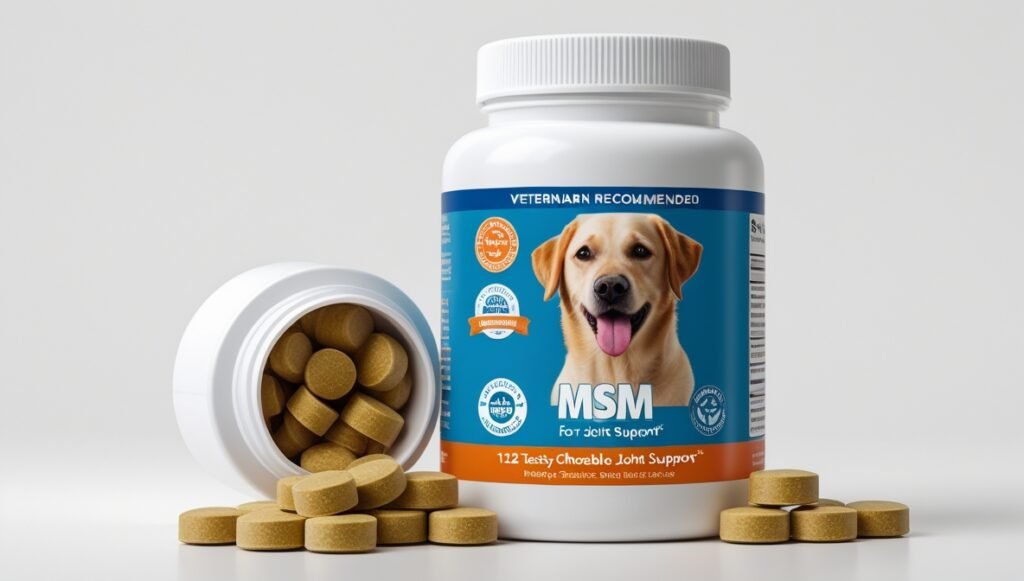
Choosing the Best Joint Health Supplement
With countless products on the market, how do you pick the right one? Keep these factors in mind:
- Quality of Ingredients: Look for supplements with high-quality, well-sourced ingredients. Glucosamine HCl or sulfate, natural chondroitin (often from shark or bovine cartilage), and pure fish oil are good signs. Avoid products that list “joint blend” without specifics. The percent of active ingredients matters – ideally 100% active (no fillers) or close to joint health supplement for dogs. Check that each dose delivers therapeutic amounts of each component (e.g. a dog of your dog’s weight should get at least 1000 mg glucosamine per 25 lbs of body weight).
- Label Transparency: Reputable manufacturers provide clear labels. You should see a breakdown of active ingredients per serving. Some shady brands will not disclose amounts or hide them in proprietary “complexes.” If you can’t tell how much glucosamine, chondroitin, MSM, etc. you’re getting, move on. Also, look for any additives or preservatives – the fewer, the better.
- Forms and Flavors: Consider your dog’s preferences. Will they eat a chew? If not, try a powder or liquid. Sometimes, giving a pill hidden in cheese or a pill pocket is easiest. If your dog is picky, find an unflavored powder or a chewable with a taste they love.
- Brand Reputation and Reviews: Research the brand. Good brands often have veterinary endorsements, clinical studies, or transparent production practices (e.g., made in a GMP-certified facility). Read customer reviews (e.g., on Amazon or pet store sites) to see if other dog owners have seen real benefits. However, take single reviews with a grain of salt – focus on overall trends.
- Veterinary Advice: Consult your vet for product recommendations. They know your dog’s health history and can suggest a supplement (or prescription joint support) that fits your joint health supplement for dogs. Some vets even prescribe veterinary-formulated joint supplements with strong evidence behind them (like Dasuquin or Cosequin with specific formulations joint health supplement for dogs.
- Price vs. Value: High-quality supplements can be pricey because of potent ingredients. Beware of extremely cheap products – they often skimp on active compounds or add fillers. It’s usually worth spending a bit more for a trusted brand with proven results. That said, the most expensive is not always the best; compare ingredient amounts, not just price.
Additional Tips for Joint Health
Supplements help a lot, but they work best as part of a broader approach to healthy joints:
- Exercise: Regular, moderate exercise keeps joints and muscles strong. Walking, swimming, or gentle play are ideal. Avoid high-impact activities (like intense jumping) if your dog already has joint issues joint health supplement for dogs.
- Maintain Healthy Weight: Even a few extra pounds can double the stress on a dog’s hips and knees. If your dog is overweight, work on a weight-loss plan (vet-guided diet + exercise). Lean dogs have the strongest joint support.
- Comfortable Living: Provide a soft bed, especially for senior dogs. Non-slip flooring or rugs can help older dogs avoid sliding and injuries. Some owners use ramps to help arthritic dogs get into cars or onto furniture joint health supplement for dogs.
- Physical Therapy: Techniques like canine massage, hydrotherapy (water treadmill), or gentle stretching can improve mobility. Ask your vet about rehabilitation options.
- Monitor and Vet Care: Keep an eye on any limp or reluctance to move. Early signs of arthritis are often subtle. Regular vet checkups can catch joint degeneration early joint health supplement for dogs. Your vet may recommend X-rays or specific treatments if needed.
- Anti-inflammatory Foods: Adding natural ingredients to the diet, like fish oil (if not in the supplement), turmeric, or certain vegetables, can complement supplements. Always introduce any dietary change gradually and under guidance joint health supplement for dogs.
FAQs About Dog Joint Supplements
- What is the best joint supplement for dogs?
The “best” supplement depends on your dog’s needs. Generally, look for products with glucosamine, chondroitin, and MSM – these have the most research support. For instance, Nutramax Cosequin, GlycoFlex, and Zesty Paws are popular brands. However, the best choice is the one your dog takes consistently and tolerates well. Always consult your vet for recommendations. - How soon will a joint supplement work?
Joint supplements are not instant painkillers. They often require 4–8 weeks of daily use to show noticeable improvement, as they work by gradually improving joint health. Clinical studies saw significant pain reduction around 90–150 days. Continue use as directed; skipping doses can reduce effectiveness. - Can I give human joint supplements to dogs?
No. Many human supplements (like glucosamine capsules) use ingredients safe for dogs, but dosages and forms are not optimized. Also, some human supplements contain xylitol or other sweeteners toxic to dogs. It’s best to buy products made for pets to ensure safety and correct dosing joint health supplement for dogs. - Are joint supplements safe for dogs?
Yes, most joint supplements (glucosamine, chondroitin, MSM, fish oil) are safe with minimal side effects. Occasional stomach upset or diarrhea can occur; if this happens, lower the dose and give with food. Always follow the label instructions. If your dog is on other medications, check with your vet about potential interactions. - How do I give a supplement to a picky dog?
- Hide it in food: Mix powder into wet food or a spoonful of broth.
- Use treats/pockets: Many chews are flavored like treats. For pills, use pill pockets or cover in cheese/turkey.
- Gradual introduction: Add the supplement slowly, mixing with something tasty, then gradually taper to the full dose.
If nothing works, try a different form. Liquid might smell tempting (fish aroma), or try a highly flavored chew.
- Do puppies need joint supplements?
If the breed is prone to hip/elbow issues, some vets recommend starting a joint supplement early (after weaning) for building cartilage health. However, many puppies on balanced puppy diets get the required nutrients already. Always confirm with your vet before giving supplements to young puppies joint health supplement for dogs. - Should I only give supplements when my dog shows pain?
No – it’s better to be proactive. Supplements are often more effective when used consistently before severe joint damage occurs. For dogs at risk (large breeds, active seniors), daily supplementation can help slow the degenerative process even if they seem fine. - What about cats?
Cats can get arthritis too. Look for joint supplements labeled for cats or that list feline dosing. Ingredients like glucosamine, fish oil, and taurine are common. The doses will be smaller joint health supplement for dogs. Do not substitute dog chews for cats; use cat-specific products. - Can supplements replace vet-prescribed meds?
Not entirely. Supplements are supportive, not a replacement for necessary medical treatment. If your vet has prescribed NSAIDs or other therapies for arthritis, continue them and discuss adding supplements for long-term support. Over time, some dogs on effective joint supplements may manage well with lower pain med doses, but this should be done under veterinary guidance.
Conclusion
A high-quality joint health supplement for dogs can make a real difference in your pet’s mobility and comfort. By providing key nutrients (glucosamine, chondroitin, MSM, Omega-3s, etc.), these supplements help keep joints lubricated and cartilage healthy. We’ve covered how to choose the right form (powder, liquid, chew), what ingredients to look for, and how to tailor supplements to your dog’s size and age. Remember to combine supplements with exercise, weight management, and regular vet care for the best results. With the right regimen, your dog can enjoy a happier, more active life joint health supplement for dogs.
Have you tried joint supplements with your dog? Share your experiences in the comments below, and please share this guide with fellow pet owners who want the best for their furry friends!
Sources: Data and recommendations were compiled from veterinary and expert sources, including the American Kennel Club and recent veterinary research, to ensure accurate, up-to-date advice on canine joint health joint health supplement for dogs.









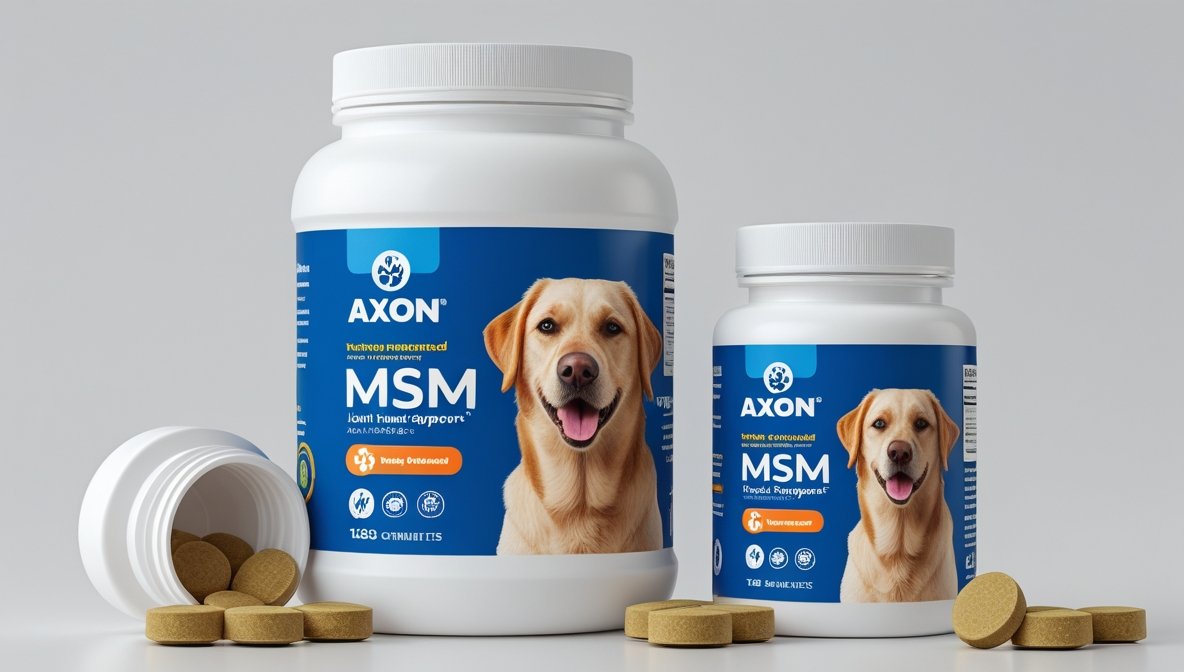






Comment on “Joint Health Supplement for Dogs: Your Guide to Happy Joints”